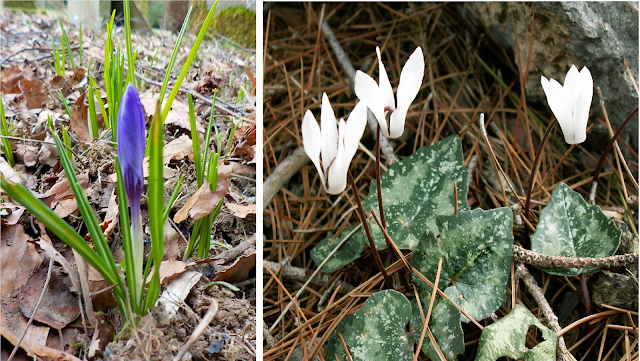Before we get on to what delights are in store in February, let's have a quick look back at January, starting with the flowers. Can anybody claim an earlier sighting of snowdrops than the 18th when Ishbel spotted these in Cumbria? Congratulations to Yvonne Payne in Crete, who won the #overwintering_insects challenge with her find of a Death's Head Hawk Moth caterpillar. I managed to find a Black Snail Beetle under a rock, and hopefully, we all managed to spot a robin.
This month's flowers to spot are crocuses in Northern Europe and cyclamens in southern Europe. As usual, send your pictures to Naturalists (the facebook page that accompanies this blog). #FebruaryFlowers. Around The Mediterranean you'll start to see many more flowers now.
Insects will be hard to find in the north, but Crane flies (which are true flies with only one pair of wings) are about and are very beautiful when looked at up close. Their wings are like stained glass windows. Down around The Mediterranean, it is olive harvesting season, so keep an eye out for the olive fruit fly. Luckily they are not a serious pest, but like all fruit flies, they have an annoying habit of diving into your drink when you're dining al fresco.
 If
you're photographing insects with your phone, you may well be
interested in this bit of kit which I have on order. It's a clip on
60x microscope lens. It should be arriving today so I'll let you know how
I get on with it. Click on image for details.
If
you're photographing insects with your phone, you may well be
interested in this bit of kit which I have on order. It's a clip on
60x microscope lens. It should be arriving today so I'll let you know how
I get on with it. Click on image for details.February is a good month for bird watching at lakes and reservoirs. The snipe, on the left, I photographed in Crete a few winters back, and the Goosander, I snapped here on the river Derwent last February. Send your pictures to Naturalists . #BirdsAndWater
As for reptiles and amphibians, this is a subject that I would normally leave until next month, which is when frogs and toads traditionally start to spawn. But as the climate warms we are starting to see them spawn as early as January occasionally. So, this month's Challenge is simply Spawn. Send your pictures to Naturalists . #FebruaryChallenge.
Usually, when I take a stroll around Cockermouth cemetery, I'm sure to spot a pair of red squirrels and maybe a rabbit or two. Yesterday however, there wasn't a sign of life. The cemetery was dead, so to speak. That notwithstanding, I'm after your photos of #MammalsInCemeteries (you know where to post them now).
The best photos from the #FebruaryChallenge, #BirdsAndWater and #MammalsInCemeteries will be featured in next month's Almanack.
Best mammal photo from January came from
Sougato Bhattacharyya in India. It is of a Sambar Deer and her calf. A vulnerable species native to the Indian subcontinent, South China and South east Asia.
Steve's Wild Kitchen
There is plenty to forage in February, even up in the northern latitudes. All sorts of things from ash seeds to yarrow, whilst down around the Mediterranean the fields are awash with the bright yellow flowers of wood sorrel, the roots of which can be used as a substitute for bean sprouts in Asian cookery (see Chicken Chow Mein with Wood Sorrel Root). My forage plant of the month, which you can find almost anywhere in Europe at this time of year is Cleavers, those sticky stemmed plants that cling to your legs as you attempt to walk through them. When cooked they are excellent in curries and similar dishes such as Cleaver Cumbry. Meanwhile, the gorse flower wine from last month is bubbling away nicely in the demijohns, which means that the fermenting bin needs replenishing. February's wine is going to be Young Nettle Wine. You can use the Generic Country Wine recipe for this but you must simmer the nettles gently for about half an hour before putting them in the fermenting bin and topping it up to 8 litres.
That's all for this month. Dont forget to share your nature thoughts, photos and comments on Naturalists (the facebook page that accompanies this blog), or leave a comment in the box below.
Click on a cover to read the first few pages.
All books except The Quick Guide are yours for FREE on Kindle Unlimited!
|
See sample pages of all my books and keep abreast of latest publications here: |
All the best,
Steve


















Good luck with the nettle wine - we had a bottle of Peter's the other evening. He certainly had more success with this than the gorse. Hope you have survived the recent gales without problems. Damage here, on our part of the North Norfolk coast, ranged from broken railings, to moved and upturned beach huts, to destruction of a stretch of the revetments.
ReplyDelete